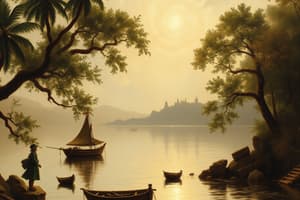Podcast
Questions and Answers
What is literature?
What is literature?
Any written work that is an expression of human experiences, written in words, well-chosen and arranged.
Which of the following is NOT a characteristic of literature?
Which of the following is NOT a characteristic of literature?
- Spiritual Value
- Artistry
- Universality
- Popularity (correct)
Great literature is only relevant to its time.
Great literature is only relevant to its time.
False (B)
What does the permanence of literature refer to?
What does the permanence of literature refer to?
What is the importance of intellectual value in literature?
What is the importance of intellectual value in literature?
Which literary form was prominent during the Pre-Colonial Era in the Philippines?
Which literary form was prominent during the Pre-Colonial Era in the Philippines?
The literary forms during the Spanish period included ____________ and ____________.
The literary forms during the Spanish period included ____________ and ____________.
What are the main themes of propaganda literature during the American period?
What are the main themes of propaganda literature during the American period?
What key event is associated with the Contemporary Period of Philippine Literature?
What key event is associated with the Contemporary Period of Philippine Literature?
Flashcards are hidden until you start studying
Study Notes
Learning Objectives
- Actively participate in class discussions.
- Identify characteristics of and navigate through the history of Philippine literature.
- Appreciate the moral lessons in literature as they relate to real life.
Definition and Characteristics of Literature
- Literature, derived from "literatura" in Latin, encompasses any written work that expresses human experiences.
- Key characteristics of literature include:
- Universality: Appeals to all and has timeless and timely relevance.
- Artistry: Exhibits aesthetic qualities and a sense of beauty.
- Intellectual Value: Stimulates critical thinking and enriches cognitive processes regarding life and nature’s truths.
- Suggestiveness: Evokes emotional responses through symbolism and implied meanings, enriching perceptions of ordinary experiences.
- Spiritual Value: Elevates the spirit, inspiring motivation and moral lessons from literary works.
- Permanence: Measured by a written work's ability to endure through time.
- Style: Reflects the unique expression of the author's thoughts and style.
Historical Context of Philippine Literature
-
Pre-Colonial Era:
- Dominated by oral literature, including folktales, myths, lullabies, and proverbs.
- Notable forms: tanaga (quatrain poems), epics, fables, and riddles.
-
Spanish Period:
- Divided into religious, secular, and propaganda literature.
- Prominent works include the “Pasyon,” “Noli Me Tangere,” and “El Filibusterismo.”
-
American Period:
- Noted for poetry and drama that critiqued Spanish rule and celebrated heroism, particularly during the Katipunan movement.
-
Japanese Period:
- Focused on poetry, fiction, drama, essays, and the use of newspapers for literary dissemination.
-
Contemporary Period:
- Marked by the Edsa People Power Revolution.
- Acknowledge the impact of foreign invasions on Filipino history, culture, traditions, and beliefs.
Literary Awards and Recognition
- Numerous awards recognizing contributions to Philippine literature throughout its diverse historical phases.
Tasks and Activities
- Written Task: Read “Padre Faura Witnesses the Execution of Rizal” by Danton Remoto and respond to a prompt.
- Performance Task: Create a poster illustrating five characteristics of literature using traditional drawing methods with specified formatting.
Studying That Suits You
Use AI to generate personalized quizzes and flashcards to suit your learning preferences.




